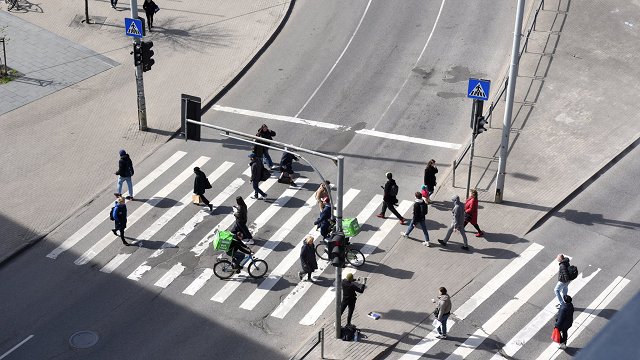Compared to Q2 2022, the average monthly earnings increased by EUR 163 or 12.0 %. Hourly earnings before taxes went up to EUR 10.48 or by 13.8 %.
Compared to Q1 2023, in Q2 2023 average gross earnings increased by 4.3 % and hourly earnings by 14.1 %.
The average net wages and salaries (calculated based on the labour taxes applicable to employers) comprised EUR 1 114 or 73.0 % of the gross earnings. Overtaking the climb in the consumer prices by 0.1 percentage point, net earnings increased by 11.7 %, pointing to a milder slowdown in the purchasing power of salaried workers.
In Q2 2023 median gross wages and salaries for full-time work amounted to EUR 1 215. Compared to Q2 2022 (EUR 1 078), it increased by EUR 137 or 12.7 %. In Q2 2023, net median wages (after taxes) constituted EUR 888 and rose by 11.0 % over the year.
In public sector rise in the average earnings was sharper than in private – 12.2 % and 11,9 %, respectively.
In Q2 2023, the average monthly gross earnings before taxes in public sector amounted to EUR 1 549, while in private – lower by EUR 30 (EUR 1 519). The average earnings in general government sector, which includes central and local government institutions as well as enterprises controlled and financed by the central and local government, went up to EUR 1 492 or by 10.7 %.
Compared to Q1 2023, the average earnings in public sector increased by 8.9 %, of which by 9.2 % in general government sector, but in private sector the rise was lower – by 2.4 %.
In Q2 2023, compared to Q2 2022, the national wage and salary fund increased by 13.2 % or EUR 399.4 million while number of salaried workers, recalculated into full-time units, by 7.7 thousand people or 1.0 %.
In terms of economic activities, the sharpest rise in the average earnings was registered in agriculture, forestry and fishing by 20.2 % (the largest rise in fishing), water supply, sewerage, waste management and remediation activities by 19.0 %, mining and quarrying by 18.9 %, transportation and storage by 18.0 % (the largest rise in air transport sector), energy sector by 15.2 % and public administration by 14.6 %. It should be noted that the rapid rise in water supply, sewerage, waste management and remediation activities, mining and quarrying and energy sector was affected not only by the increase in earnings but also by the decline in the number of full-time workers.
In Q2 2023 the average gross monthly wages and salaries for full-time work above the national average were recorded in financial and insurance activities (EUR 2 656), information and communication (EUR 2 523), energy sector (EUR 2 041), professional, scientific and technical activities (EUR 1 937), public administration (EUR 1 777), mining and quarrying (EUR 1 710), human health and social work activities (EUR 1 662), water supply, sewerage, waste management and remediation activities (EUR 1 582) as well as agriculture, forestry and fishing (EUR 1 552).
In Q2 2023, compared to Q2 2022, the average gross wages and salaries in Estonia and Lithuania had a similar rise: 12.4 % in Estonia and 12.3 % in Lithuania. Latvian annual growth rate was slightly lower – 12.0 %.
All Baltic states increased national minimum wage in 2023. The highest increase may be observed in Latvia – of 24.0 % (from EUR 500 to 620), followed by Lithuania with 15.1 % (from EUR 730 to 840) and Estonia with 10.9 % (from EUR 654 to 725).





























